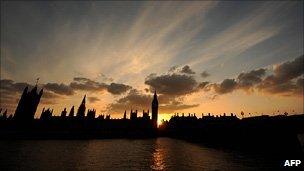Four-year fixed term parliament bid defeated
- Published
Ministers have seen off a bid in the Commons to limit fixed-term parliaments to four years, not five as planned.
Plaid Cymru, backed by Labour and the SNP, had proposed an amendment to the bill, which would have seen the next election held in 2014.
Plaid MP Jonathan Edwards argued that four years was the "obvious norm" for UK election cycles and the date chosen was done so for "political expediency".
But the amendment was lost by 242 votes to 315 - a government majority of 73.
The government wants to change the law so UK general elections are held on a fixed, five-year cycle. Currently the prime minister can choose the date of the next general election at any time within a five-year period - which means they can choose the time judged most favourable to themselves.
However there has been some criticism of the decision to go for a five-year, not a four-year term.
In the Commons debate, Mr Edwards argued that four-year terms were used for the Welsh Assembly, Northern Ireland Assembly, London mayoral elections, and council elections across the UK.
"It is quite clearly an obvious norm for the electoral cycle within the nation state."
He said a four-year term would attract greater consensus on already controversial measures, which were being "steam-rollered" through Parliament.
'Profoundly cynical'
Conservative backbench MP Richard Shepherd also raised concerns about the five-year term. He told MPs there was a principle that governments were "mindful of the time in which the electorate should have a judgment" on its actions.
"That is all cast out for what I believe is profoundly cynical; the entrenchment, or the attempted entrenchment, of a particular parliament for five years."
His fellow Conservative Andrew Percy also said he felt "in my gut" that a four-year term would be better.
Labour MP Mark Tami said the five-year term was "really all about this Parliament and holding this coalition together" while his colleague Austin Mitchell suggested it should be three years as people wanted to keep MPs "on a shorter leash".
Shadow justice minister Chris Bryant said a five-year fixed term was "over long" and was chosen because "the government wants to be able to continue until May 2015".
But Conservative Eleanor Laing said four years was "the norm for district councils, county councils, parish councils ... They are not Parliament."
And Cabinet Office minister Mark Harper argued that a five-year term would bring "strong and stable government" and said the statistical evidence - excluding three short parliaments since World War Two, was that parliaments lasted four and a half years.
He dismissed suggestions that previous five-year terms tended to be cases where governments were "clinging to power".
"Elections called early, before the five-year term is up, are usually examples where the prime minister of the day thought that to do so might give their party a political advantage. It was not that they somehow felt that four years was the constitutionally more appropriate length of time."

The government wants five-yearly general elections
Mr Harper also told MPs the government would allow elections in Scotland and Wales to be moved by up to six months to avoid clashing with a general election - following warnings from nationalists.
If the fixed-term plan goes through, the next general election will be held on 7 May 2015, the same date as elections to the Scottish Parliament and the Welsh Assembly.
Mr Harper said: "We will consult with the parties in the devolved Scottish Parliament and Welsh Assembly to give them a power to defer the date of their elections by up to six months, so in other words move it into the future to avoid coinciding with this house."
The power to bring devolved elections forward already exists where two-thirds of Welsh Assembly Members or Members of the Scottish Parliament agree.
- Published15 November 2010
- Published18 April 2011
- Published22 July 2010
- Published2 July 2010